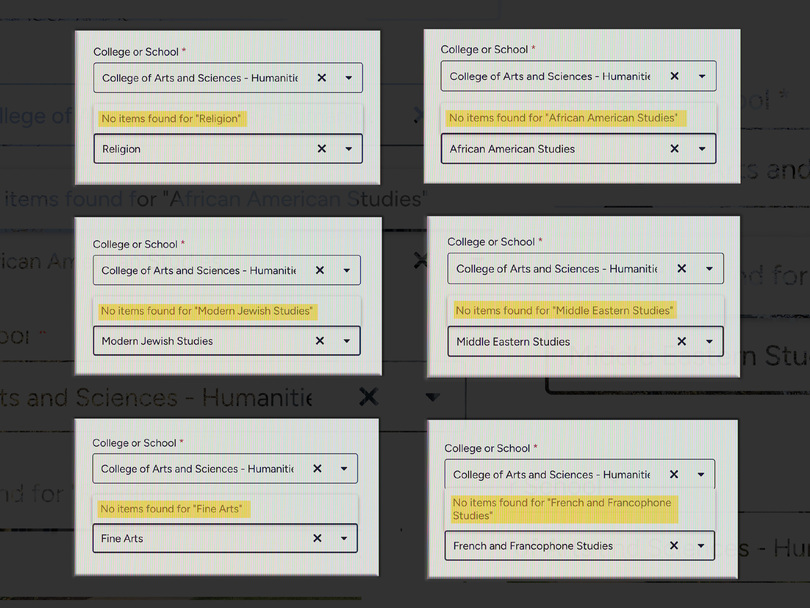College of Arts & Sciences pauses admission to 20 majors amid portfolio review

“Speaking for myself, I felt entirely blindsided. I was clearly not alone.” Syracuse University paused admission into 20 majors in the College of Arts & Sciences without faculty input as part of its ongoing portfolio review. Design by Ilana Zahavy | Presentation Director, Snapshots via Common App
Get the latest Syracuse news delivered right to your inbox.
Subscribe to our newsletter here.
Update: This post was updated at 4:41 p.m. on September 19, 2025.
Syracuse University paused admission to 20 majors in the College of Arts and Sciences without faculty input as part of its ongoing portfolio review.
Arts and Sciences Dean Behzad Mortazavi informed department chairs representing humanities, math and natural sciences of the enrollment pause in a Monday meeting, a department chair in attendance told The Daily Orange.
“The most important thing is the way they did it,” said the chair, who asked to remain anonymous due to potential retaliation. “It continues the culture of mistrust and worry, like people are really worried.”
The 20 majors from Arts and Sciences are no longer listed on SU’s Common Application for first-year and transfer students.
Now-Vice Chancellor and Provost Lois Agnew had instructed each dean to begin an academic portfolio review within their school or college, she announced in an Aug. 20 campus-wide email. The deans were provided with “detailed data” – including enrollment trends, course and faculty information – to examine their respective programs, degrees and majors.
“I have asked the deans to work closely with their faculty to determine which programs are stable, which could benefit from re-envisioning or re-branding and which, based on clear evidence and market demand, may need to be phased out,” Agnew wrote.
The deans will deliver the recommendations to the Provost by the end of the semester, and she plans to report the next steps during January’s University Senate meeting, according to the August email.
Ahead of Monday’s meeting, Arts and Sciences faculty were instructed to prepare an update on their department evaluations. Before chairs presented, Mortazavi shared an image listing the college’s over 50 majors, color-coded in orange and blue based on their current status.
“Importantly, your input will help shape what happens next—whether programs are redesigned, merged, or ultimately closed,” Mortazavi wrote in a Wednesday email, obtained by The Daily Orange, to the college’s chairs and program directors. “Faculty engagement remains central to this process, even though the pause decision required immediate action to meet admissions deadlines.”

Image obtained by The Daily Orange
An image from Monday’s meeting, highlighting “paused” and “cut” programs. This photo has been cropped to ensure privacy.
The Bachelor of Science in Earth Sciences and Bachelor of Arts and B.S. in Ethics — highlighted in blue — were said to be “cut,” the chair said the dean explained. The B.A. in Earth Sciences is still enrolling students. The Earth Science BS was intentionally phased out by the department to make way for revamped BS programs in Environmental Geoscience and Geology, the chair of the Department of Earth and Environmental Sciences told The D.O. Friday.
The following 18 majors were put on “pause”:
- African American Studies
- Applied Mathematics B.A.
- Chemistry B.A.
- Classical Civilization
- Classics (Greek and Latin)
- Digital Humanities
- Fine Arts
- French and Francophone Studies
- German Language, Literature, and Culture B.A.
- History of Architecture
- Italian Language, Literature, and Culture B.A.
- Latino-Latin American Studies
- Middle Eastern Studies
- Modern Jewish Studies
- Music History and Cultures
- Religion
- Russian Language, Literature, and Culture B.A.
- Statistics B.A.
The pause in enrollment surprised the chairs in the meeting, James Haywood Rolling Jr. – interim chair of the Department of African American Studies and professor in the School of Education – said in a Wednesday statement to The D.O.
“Speaking for myself, I felt entirely blindsided. I was clearly not alone,” Rolling wrote. “Based on conversation with other chairs, we all were.”
Following Mortazavi’s Monday announcement, the chairs presented their portfolio reviews.
“What should I present that might help this situation that I just learned about, you know? We were in shock,” the chair said.
In his Wednesday email, Mortazavi wrote that programs on pause won’t be removed from SU’s course catalog. The offerings will continue to be taught.
During Wednesday’s senate meeting, Agnew addressed faculty concerns surrounding the pauses.
“We have 462 degree-bearing programs. The average for institutions of our size is 235,” Agnew said at the meeting. “This means that we’ve tried to support more programs than we can afford, and have not adequately invested in programs that have high demand.”
She said the pause will last one year. Then, the administration will make a final decision about each program.
“That could be to revise. It could be to close. It could be to merge with other programs. There are a lot of different directions we could take,” Agnew said.
If the university was not “absolutely sure” about the long-term vitality of a program, it closed its enrollment on Common App, Agnew said. This was to prevent a “difficult situation” where an incoming student declares a major with very low enrollment.
“If the program continues to be offered the next year, we will have a stronger message about its viability, and we hope we’ll be able to ensure that we have a major that’s not only two or three students who are making their way through the major together,” Agnew said.
In his email, Mortazavi wrote that each program has 10 or fewer students enrolled, accounting for less than 2.5% of Arts and Sciences students.
Speaking for myself, I felt entirely blindsided. I was clearly not alone. Based on conversation with other chairs, we all were.Dr. James Haywood Rolling Jr., AAS Interim Chair
The review has been based on nine years of data that shows “very low” and declining enrollments, Agnew said Wednesday. Mortazavi said in his Wednesday email that five years of course enrollment information was also considered.
“For the well-being of the programs and the students in the programs, it’s important to find a way forward so that students have the best academic experience and we are able to show students, as best we can, what should encourage them and motivate them to come to Syracuse,” Agnew said. “And the answer to that is always distinctive and excellent programs.”
Mortazavi asked each department to come to the meeting with categorizations based on the nine years of compiled data, but did not include “narrative” data, Rolling wrote. As a researcher, the lack of narrative data “renders the numerical data incomplete,” he wrote.
“There’s a disproportionate targeting of humanities programs, and so of course humanities programs are going to have fewer students,” another department chair who was in the meeting told The D.O.
A faculty member, who was not at the meeting, claims the dean made this decision in August, only a few days after Agnew announced the academic portfolio reviews.
“It seems that already, at that point, decisions were made, and it’s very, very problematic that the faculty, the Senate, the committees that you know are involved in the curriculum have been totally bypassed so far,” the faculty member told The D.O.
It is unclear if department chairs will have the opportunity to appeal the decisions once finalized.
The second chair, who also asked to remain anonymous due to potential retaliation, said diminishing humanities programs limits the “all-around education” of students.
Although these courses will still be offered, taking away the major is just the “first step” in removing them entirely, the second chair said.
Students currently studying the paused majors and minors will continue their studies, Rolling wrote.
He wrote that the chairs were also told that there would be no discussion of master’s or PhD programs “at this time.”
In the coming weeks, Mortazavi will collaborate with faculty “on reimagining programs to better align with student interests and institutional strengths,” he wrote in the email.
Rolling added that the pause could be a “critical opportunity” to rebuild, pointing to the School of Education’s overhaul as proof that departments can re-envision themselves to stay vital. He also warned that AAS and other programs will not be saved by “focusing ire on any individual dean.”
“How we apply our energies going forward is critical. The struggle at hand is much, much larger than this university alone,” Rolling wrote.
CLARIFICATION: The programs in blue were already in a voluntary phase-out period, not cuts demanded by the college. The Earth Science BS was intentionally phased out by our department to make way for revamped BS programs in Environmental Geoscience and Geology, the chair of the Department of Earth and Environmental Sciences clarified in a Friday statement to The D.O.
Managing Editor Rosina Boehm and Social Media Editor Griffin Uribe Brown contributed reporting to this article.





